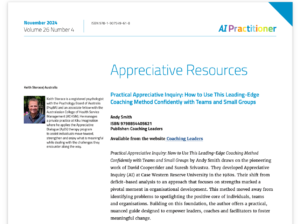How Our Assumptions Influence Our Questions

[ad_1]

Note: this article follows on from previous articles about appreciative coaching, Why We Assume Something Is Working For Every Client and How to Instantly Improve the Coaching Relationship, so you might want to read those first.
When you’re having a casual conversation, you don’t have to think about your sentence construction, at least if you’re speaking in your native language. Your mind’s unconscious processing effortlessly puts words together in an understandable and (probably) grammatically well-formed order, without you having to consciously think about them, in a way that reflects your ’internal representation’ (as the NLP jargon has it) of what you wanted to say.
Depending on the assumptions in that internal representation, your questions exploring a coaching topic will come out very differently.
If you assume that your client may or may not have had any good experiences of a given coaching topic (let’s say, for example, improving emotional self-control), then it will seem natural to ask closed questions (to which the answer would be either ‘yes’ or ‘no’). After all, you’re just trying to get at the truth of the situation:
“Have you had any good experiences of successfully controlling your emotions in difficult circumstances?”
If the client says ‘yes’, you can go on to ask them to tell you about it. But what if they say ‘no’? That’s quite likely, if they can’t think of an instance straight away and they feel like you’re waiting for their answer, so they have to say something. Then where do you go? You’ve closed off that line of questioning, and potentially missed some valuable information.
Note that the question presupposes or assumes that they may not have had any good experiences – and our brain’s natural tendency to pay more attention to negatives means that the ‘no’ answer is quite likely to come up.
Contrast that with the questions that naturally form when you start from the assumption that there are things working in the coachee’s life in relation to this topic. Because your internal representation of reality expects that you will find something working, your unconscious verbal processing is much more likely to come out with an open question like:
“What good experiences of controlling your emotions have you had?”
or
“Tell me about a time when you successfully controlled your emotions in difficult circumstances.”
This line of questioning is much more likely to elicit examples of what you’re looking for. Even if your client can’t think of an example at first, you’ll ask the question in different ways and keep exploring until you find one – because you’re assuming that there’s something there to find.
You probably won’t have to consciously remind yourself to ask open rather than closed questions (at least once you’ve got into the habit), because the open questions flow naturally from the assumption that there’s something working in the client’s experience. If you’re truly operating from that assumption – and remember that the reason you’re asking questions is to focus the client’s attention on where they can find their own resources, rather than gathering information so you can analyse and solve the problem for them – your unconscious mind will automatically come out with open, generative questions.
If you are 100% present for your client and genuinely interested in them, you don’t have to consciously match their body language or voice tone to achieve rapport (the matching will happen automatically).
In the same way, holding the assumption that there are some things working in your client’s situation (and that they have all the resources they need to make the changes they want) will make it easier to formulate the right words for your open questions without having to consciously think about it, making coaching much easier.
[ad_2]




